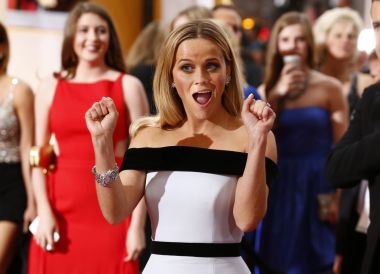Sexism in Hollywood: Why everyone should 'Ask Her More'

It's no secret that there's a huge gender problem in Hollywood. From a staggering pay gap to the overwhelming majority of speaking roles going to men, women remain woefully under-represented on the silver screen.
Researchers at San Diego State University found that women comprised just 12 per cent of protagonists featured in the top 100 grossing films of 2014 – a decline of 3 per cent from the previous year.
Females accounted for 29 per cent of major characters, and less than a third (30 per cent) of all speaking characters. And the problems continue off screen; just 17 per cent of all directors, writers, producers, editors and cinematographers working on the top 250 domestic grossing films in 2014 in the US were women. In the same year, a staggering 93 per cent of films had no female directors at all.
Statistics like that can't be ignored, and the world is starting to wake up. The 'Ask Her More' campaign, initiated by The Representation Project, has gained increasing attention – with actresses Reese Witherspoon, Julianne Moore and Lupita Nyong'o calling on reporters to be more creative in their questions on the red carpet than just asking who they're wearing.
"We're more than just our dresses," Witherspoon told ABC at the Oscars last night. "There are 44 nominees this year that are women and we are so happy to be here and talk about the work that we've done. It's hard being a woman in Hollywood, or any industry."
To reduce a women to the clothes that she's wearing on the same evening that you're supposedly celebrating her achievements as an actress (or, indeed, model, singer, politician, scientist, or any other occupation) is absurd, but commonplace. As Hadley Freeman eloquently puts it: "This is a strange pocket of the western world where it is still deemed utterly acceptable to take smart, successful women and reduce them to beauty pageant contestants, with the press holding them and inspecting their shiny hair and shiny accessories and shiny outfits as if they were My Little Pony dolls, while the men stand manfully in their backgrounds."
Women are paraded up and down a strip of coloured fabric and almost literally thrown into the hands of waiting tabloids. Even their hands aren't beyond scrutiny, while men get away with wearing yet another slim-fit suit. It's unbelievably archaic.
The battle for equality begins with the media. To get people's attention, to show them how deeply ingrained sexism is, you have to go to where they are – and they are watching television. 43 million people tuned in to watch the Oscars in 2014, and a similar number is expected to have done so last night. That means over 40 million people saw Julianne Moore, who won best actress for her role in Still Alice, discuss Alzheimer's, and Patricia Arquette use her acceptance speech for Boyhood to demand equal pay. Not to mention Steve Carrell and Jake McDorman wearing He for She cufflinks, and proving this is not women's battle to fight alone.
While it's utterly ridiculous that an accomplished woman should have to campaign for the opportunity to tell her story, Ask Her More is evidently working. It's a powerful tool in the movement against inequality, and adding more voices to the conversation can only be a good thing.











